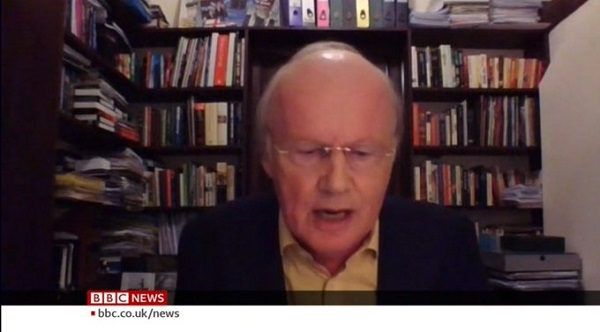The COVID-19 pandemic has come at a particularly interesting time in history because unlike the 1918-20 Influenza pandemic, people in a lot of places around the world are now connected not only by radio and television but with the ability to make video calls in real time. This used to be the kind of thing that was only dreamed about in the realms of science fiction but which we are perhaps in danger of being bored by.
In the 1968 movie '2001: A Space Oddessy', included with a bunch of glimpses into an imagined future, along with tablet computers, artificial intelligence, and the obvious paraphernalia to go along with space travel, is a short sequence in which Dr. Heywood Floyd makes a video call to his daughter. He is charged $1.70 for the call, which is only time that any amount of money is referenced in the movie and he pays for it by credit card; which itself must have been pretty neat in 1968¹.
54 years later, we might not have yet set up colonies on the moon or in space (which might disappoint the people of 1968) and certainly not hotels in space but we do have video calls, albeit with people's private computers rather than phone booths.
2001 imagined that the video phones that we'd be using were probably of a fixed line type, like when we all used to have only one telephone in our house. The cameras that we are actually using in the 21st century aren't stand alone devices which are connected to fixed lines but peripherals for computers; which does include the hard built peripherals in our mobile phones. What I don't know if the world of 2001 could have imagined, was how curated the view through the camera was going to be.
YouTube went through a sort of early era in which mostly people in their late teens and early twenties recorded video blogs in their bedrooms. They very quickly realised that they were being judged for what was in the background and it became the norm quite quickly to move into curated corners which included bookcases and knick-knackery. In some cases where they have gone on to be professional, what used to be in people's bedrooms has in some cases been replicated in a studio.
What the COVID-19 pandemic has done, is force loads of people who would otherwise have never have been in front of a camera, to go through the same process of curating the visible space; specifically for broadcast transmission on Skype, Zoom, Facebook Messenger and a bunch of other platforms. In this respect, the desire to project a curated image is as strong for older people and people in professional media as it was for the teenagers and twenty somethings in their bedrooms.
The symbol of the COVID-19 pandemic for me, is not the use of facemasks but the one thing that has mysteriously appeared in the background of people's video calls - The Bookcase Of Credibility.
The presumption by the audience who sees a Bookcase Of Credibility is that the person who is sitting in front of it has read a lot of books. The beauty of the Bookcase Of Credibility as a signalling device is that it isn't necessarily true that someone has actually read any of those books, nor is it true that the quality of those books need be equal.
As far as we out here on the other side of the curated camera view are aware, they could all be Mills and Boon or Harlequin romance novels and provided they were in semi nice leather backed binding, we'd be none the wiser. In fact, the books themselves don't even have to be real; they could all just be just the spines presenting a facade, just as hokey as 23 and 24 Leinster Gardens which are fake facades hiding a ventilation hole for the London Underground from the days when they used to run steam trains underground¹.
The Bookcase Of Credibility is fast becoming a necessity for people who work in the news media or alternatively as I have learned through the medium of audio via podcasts, it is useful for projecting the facade that someone is really organised instead of sitting on the couch covered in cat hair and Cheetos dust, while wearing active wear and trackpants.
What the Bookcase Of Credibility inadvertently projects is that someone is middle class enough to have a bookcase and a dedicated space where they can make video calls from. In that respect we have gone full circle because we used to have dedicated furniture in our houses for the telephone; which may have included a seat and/or space for the telephone books.
I don't personally have a curated space or a Bookcase Of Credibility because as a renter, I don't exactly have the ability to make wholesale changes to the internal structure of the house. Truth be told, most of the books that I have ever read have come from libraries and it is usually only those books which I know that I will want at a future date or which I can not find in a library which I will shuffle a shilling for. This means that by imprint, the most common kind of book that I have is a Penguin Orange, followed by a Penguin Black. To those of you who know what either of those things are, that might lend the impression that I have read impressive books or perhaps (and perhaps more accurately) that I am a colossal cheapskate who prefers to read books where the ravages of time have already tossed aside all of the terrible ones.
I actually have a shelf where John Maynard Keynes, Thomas Piketty, Bernie Sanders, PJ O'Rourke, Adam Smith and Jeremy Clarkson sit next to each other. Elsewhere, Margaret Atwood and Mary Wollstonecraft are off rolling their eyes with contempt, I bet. Again, none of this would help in lending me an air of credibility in the face of someone who has genuinely done proper work in a course of study but to someone who is none the wiser and just sees a stack of books, it might².
That there is the reason why the Bookcase Of Credibility is such an untruthful device. It only works to impress someone in so far as much as they are impressed and only in an upwards direction. You could very well have someone with loads of book in bookcases but they've never read any of them and more importantly, having read a lot of books is not necessarily a qualifier of the person being either intelligent or more importantly, kind. I can think of at least one famous example where the installation of a bookcase was met with justified derision because the person who had the bookcase installed was a knave.
Despite all of this, I am still somewhat impressed by the bookshelves which have appeared behind newsreaders and diplomats, on television because I would expect someone whose trade it is to wrangle information to have read a bit. It also does say something more about the person, instead of the cold and sterile environment of a television studio.
In this respect, I am a complete hypocrite because while on one hand, I am suspicious of a Bookcase Of Credibility I am also kind of impressed.
¹For a brief moment in time, it would have been possible to make a journey from the suburbs of London to New York City which involved both a trip on a steam train and the Concorde.
²And then again, if someone doesn't care about what books you've read or even if you have read any at all, we're back at square one again.



No comments:
Post a Comment